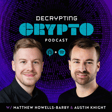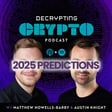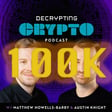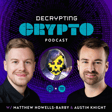Become a Creator today!Start creating today - Share your story with the world!
Start for free
00:00:00
00:00:01

A Primer on Bitcoin Layer 2s, plus the US Goverment's MEV Case
In this week's episode we dig into the exciting world of Bitcoin Layer 2s, explaining why they're important, how they work, and what to look out for. Alongside this, Austin digs into the recent case from the US Government against the Pepaire-Bueno brothers and their MEV exploit which earned them $25m.
Transcript
Introduction to Decrypting Crypto Podcast
00:00:12
Speaker
Hello and welcome to the Decrypting Crypto Podcast. It's May 16, 2024, and this is Off Chain, your weekly recap of the biggest stories in the crypto space. I'm Matthew House-Barbie, and as always, I'm here with Austin Knight. How are you doing, Austin? I'm doing all right, Matt. We're in a better position than we were a few days ago, not quite 70K, but hey, I can't complain.
00:00:37
Speaker
Well, it sounds like inflation was less worse than what we thought it'd be, which is good. I'm hesitant to say inflation's in a good place because I think that's maybe an overstatement, but certainly on track, it's giving renewed optimism at least. I think we got the jobs report coming out shortly. If not, it's already come out potentially, just haven't looked, but yeah, that,
00:01:04
Speaker
I don't know if that's going to shake things, but should be in a good place there hopefully as well. Yeah, I heard more people have full-time and part-time jobs than ever before, so I don't know how well that's going to be received, but I'll find out.
What are Bitcoin Layer Twos?
00:01:22
Speaker
Well, we're going to talk about a couple of things today. One is going to be a bit of a
00:01:29
Speaker
I guess a primer, so to speak, or a bit of an overview that I'm going to give on what I think is one of the more exciting areas of innovation happening within crypto right now that is in the shape of Bitcoin layer twos. And I think if there's appetite, we'll go deeper with some technical founders, maybe in some interview episodes over the coming weeks.
00:01:56
Speaker
And then we're going to talk about after that, a very significant and to be completely honest, very unique case that's come against our two brothers relating to MEV exploits. And this is a super interesting case that I'm actually really interested to dig into and potentially with some real
00:02:24
Speaker
real ramifications on Ethereum. So we'll dig into all of that and more right after this.
Bitcoin's Scalability Problem
00:02:40
Speaker
Bitcoin layer twos. So you may have heard some of this on crypto Twitter. It's, I would say, one of the more hyped up areas of crypto right now, along with restaking, which we've talked myself in particular plenty.
00:02:57
Speaker
about over the past few months, weeks, days. But Bitcoin layer 2 is another area that I think has a lot of hype, but also has a huge amount of promise. And I think that we're going to see a lot of exciting projects launch and further innovation happening on Bitcoin, even more so than we've seen over the past year in the form of ordinals and now runes and more. But I wanted to give a bit of an overview because
00:03:26
Speaker
it's a I think it's somewhat of a complicated topic to discuss that very quickly gets very technical and I want to try and zoom out a little bit so that everyone can kind of understand you know what they are and why they're important and what the implications for some of this stuff is.
00:03:43
Speaker
because I think it's going to be a lot of opportunities for investors, for builders, and actually for the long-term promise of Bitcoin overall. So let me just start with this Austin. If we go back to
00:04:00
Speaker
2008, the original promise and focus for Bitcoin as a blockchain. And I think, you know, it's I mean, in the Bitcoin whitepaper title, right, was to be a fully decentralized, secure P2P payments system, ultimately. Right. And where I think we have arrived today
00:04:25
Speaker
is that it has not achieved that mission at scale. And I don't believe that the Bitcoin layer one can achieve that in an efficient way.
00:04:40
Speaker
especially when you, well, and I think that the why behind that is probably centered around a couple of things. And this relates back to the classic, you know, blockchain scalability trilemma, which if you're not familiar with the trilemma, it's the argument that basically any blockchain
00:05:02
Speaker
cannot completely excel in scalability, in security, and also decentralization. It has to make a trade-off in one of those areas. And in Bitcoin's case, it's scalability.
00:05:22
Speaker
You know, there's three to four transactions per second is pretty much its max, which, you know, for a global P2P payment system, that just doesn't cut it. And this is a really long confirmation times. You know, you'd be waiting, best case, 10 minutes for a confirmation.
00:05:40
Speaker
all the way up to 40 minutes and in times of real congestion, potentially more than that. So it's slow and it doesn't scale very well. Now, is it incredibly secure? Absolutely. Is it sufficiently decentralized? For sure. It's about 60, 70,000 nodes on Bitcoin scattered across the globe. No central entity owns it.
00:06:07
Speaker
is the shining example of that. And then when you think about one layer down from the Bitcoin blockchain, BTC,
00:06:18
Speaker
It's, and this is really where Bitcoin has been successful in its use case, I guess, is the BTC asset. It has become the, you know, the gold standard crypto asset store of value and it's undisputed there. And I think that's why we see all of the, um, excitement around things like Bitcoin ETFs, et cetera. And you know, it's over a trillion dollars worth of a value in BTC, but
00:06:49
Speaker
What we've kind of seen from the Bitcoin community is a real hesitance, reluctance to try and tackle some of the scalability issues, largely because there's been no desire to make any trade-offs in the security and decentralization of Bitcoin. And I think that's fair. There was also, I think, what came from a lot of this,
00:07:16
Speaker
is the notion that people wouldn't even want to spend their Bitcoin even if they could, you know, the classic hodl culture. And what we saw last year is the introduction of ordinals, and it really burst onto the scene and was incredibly controversial. We've covered ordinals a huge amount, so we're going to go into it a whole lot, right? But ultimately,
00:07:39
Speaker
Ordinals brought NFTs to Bitcoin on chain on the Bitcoin layer one. It proved and has proved, I think objectively at this point, that one, people will use their BTC and spend it. Two,
00:08:01
Speaker
there is a desire for an expansion of Bitcoin's use cases. And I believe that is social consensus now. We're seeing that. And when you look at ordinals and NFTs, what they've done on Bitcoin is I think they're valued higher. There was a premium attached to assets that are stored in Bitcoin blocks. And you can see that in the fact that
00:08:31
Speaker
They've basically commanded the top three spots of NFT trading volume is on Bitcoin and largely has been frequently holding the number one spot. So, you know, I think we're, we're seeing this, this appetite being proven out, albeit in somewhat clunky, unscalable ways, because the trade off that comes with stuff like ordinals is that you're building everything on top of Bitcoin's layer one. And what comes with that is,
00:08:59
Speaker
huge amount of congestion, huge increases in fees, and it doesn't bring us any closer to becoming, you know, a payment system or being able to operate as a true DeFi layer. It kind of brings it further back.
Layer Two Solutions for Scalability
00:09:18
Speaker
So this is really where Bitcoin layer 2s come in. And if we think about Ethereum's journey,
00:09:29
Speaker
We talked on the podcast probably a lot in the period of around 2018 through to maybe 2020. Our biggest discussion point, Austin, was like Bitcoin, Ethereum is just not, can it actually scale? And then when we saw the mania that happened in particular, I would say 2021 around Ethereum NFTs,
00:09:57
Speaker
like gas fees are just wild. You know, you're paying like a hundred bucks easy for a single transaction. It's taken it, everything was broken, right? And it kind of begged the question, well, how the hell does this thing scale? How do we actually onboard millions and millions and hundreds of millions of users? No one's, this is unusable. And layer twos came in, right? And you had the likes of,
00:10:22
Speaker
Arbitrum, Optimism, CK Sync, StarkNet, many, many, many more, right, that have all came in to help solve the scalability problem.
00:10:33
Speaker
Did they have to make trade-offs? Sure. They had to make trade-offs in decentralization, security, for the advancement of scalability and user experience. And that has categorically benefited Ethereum. You look at the Ethereum layer two market, right? And it's a roughly $70 billion market right now. That is...
00:10:59
Speaker
Pretty valuable. And there's real usage that happens. Look at everything that's been going on now in the ecosystem. The majority of it is now happening on like layer twos. And that's where we've kind of reached to the point where we're saying, Hey, this is actually how Ethereum scales. Well, well, this is what we're trying to do right now in this current wave with Bitcoin.
00:11:21
Speaker
And this actually isn't a new phenomenon. Many of you listening may have heard of the Lightning Network. That was one of the first Bitcoin layer twos to come in and try and solve this problem. And it faced a number of challenges, right? And I will say there's a lot of different flavors that Bitcoin layer twos come in. You've got things like
00:11:47
Speaker
lightning network where you have state channels and then what we're seeing a lot more of is like side chains or roll-ups things like that and lightning network went from you know three to four transactions per second to being able to support all the way up to like a million transactions per second but has never had that kind of uptake and
00:12:11
Speaker
There's a lot of challenges that come with Lightning. I think its user experience has been very, very poor. There's also a lot of challenges in that the fees are so low that there was no real incentive in place for the node operators to stay up and running. And so you'd have loads of outages, these channels would close, et cetera, et cetera. Super clunky. And I think we're getting to the point now where there's been a bit of an exodus from the Lightning network and people are saying, hey, I don't know if this is the way this scales.
00:12:40
Speaker
There was also others that took a different approach, and also Lightning Network didn't have the ability to support smart contracts on the layer too. So that was another big limitation. There was also, around the same time, Liquid, Rootstock, and they were focused a bit more on being able to support smart contracts. Rootstock was able to be EVM compatible, so could actually connect with
00:13:08
Speaker
Ethereum. The problem was that the way the trade off they made was at a very extreme level with decentralization. And that came through the way that they
00:13:22
Speaker
their nodes around which is a federated system, I think something like 99 point, something percent of all the BTC on the liquid network was held in one address, right and it's like 60 of these like validators or nodes that were running the whole thing so
00:13:40
Speaker
You're getting trade-offs, and it's never really come to fruition. But we've had a few big breakthroughs, I think, recently, recently being somewhat in the past 12, 18 months.
Innovations in Bitcoin Layer Twos
00:13:53
Speaker
I think BitVM has been one of these. And for, I guess, the summary here, I had a really great discussion from Mani Bali, who's the co-founder of Stacks, which is a Bitcoin layer too.
00:14:09
Speaker
And he kind of described and compared BitVM, which is a Bitcoin roll-up.
00:14:17
Speaker
And some of the technology at Pioneer is very innovative. Ultimately, BitVM does not require any changes to be made to Bitcoin layer one. And this is like the big challenge, right? You want to help scale Bitcoin. If it requires the Bitcoin core devs to make changes, well, as we've seen over the years, Austin, that takes years for anything to happen and it's highly contentious and it's really, really difficult to make happen.
00:14:41
Speaker
BitVM has kind of come in and said, okay, well, we can actually build within the current constraints. And what Monib was saying is like, this is equivalent to kind of like what Arbitrum does for Ethereum and has brought quote unquote fraud proofs to Bitcoin. And what that means is you can build applications like
00:15:03
Speaker
secure bridges that can bridge BTC from the core Bitcoin layer 1 to layer 2 in a somewhat trustless way. So we're starting to bridge the gap between all of this and there's a lot of really interesting different layer 2s that are taking very different approaches.
00:15:27
Speaker
But for me, I'm extremely excited about this because when you look at the landscape right now, I'm also, I'm an investor in a number of these Bitcoin layer twos at like an early stage and most of which have not launched yet. I think we're going to see a ton of really exciting
00:15:45
Speaker
projects launch, lots will fail. Some I think are going to deliver real value. I think this has the potential to be a $100 billion plus market. If it can unlock
00:16:02
Speaker
you know, the trillion dollar worth of capital that's on Bitcoin right now, albeit, you know, it's not all on the Bitcoin layer one, but let's say even a portion of that, a couple of hundred billion dollars worth of BTC that can be put to use can create DeFi applications, can create lending markets, can have whole new applications and experiences for BTC holders that, you know, utilize the
00:16:32
Speaker
the gold standard asset across the whole of the crypto marketplace and gives a another potential revenue stream into BTC miners that as mining rewards reduce, I think is going to become incredibly important. So the net net of all of this.
00:16:48
Speaker
is I think this is an extremely exciting place to be. I think for anyone who's listening now and finds this remotely interesting, go have a little look around at some of the different layer twos that are being built. There's a really great website actually called l2.watch.
00:17:07
Speaker
So if you go to L2.watch forward slash Bitcoin, it will show you all of the different layer twos that are currently in development or have launched or in their test nets that are layer two Bitcoin projects and all different types. You'll see loads of these right now, trying to do and solve all kinds of different problems. But I think overall, it's going to be a really cool space.
00:17:35
Speaker
I think we're going to see some really cool innovation happening on Bitcoin when you consider, you know, for the longest time has not really seen any major innovation. So really cool to see. What do you think is the best way to get involved in any of these projects right now? I mean, you know, if you're listening to this and you're thinking, OK, this is really interesting, like I'm seeing this pattern of layer twos working, you know, going forward.
00:18:05
Speaker
What information would you dive into? Where would you go to either invest or get involved in some of these projects?
00:18:14
Speaker
Yeah, so there's a few ways, right? So there's a few projects out there right now that have liquid tokens, right? I think certainly the largest by market cap is Stax. I think Stax is a very interesting layer two project and is probably a good, is going to probably operate in the short term as like a,
00:18:44
Speaker
index bet on the layer two space as a whole. I imagine as the layer two space gains more narrative traction, that probably fills back into the STX token. You know, that's a theory, right? And I'll just say I don't own any STX. I'm not an investor in STX at all or anything like that. But if I was just going to dumb it down, that's probably some kind of play.
00:19:06
Speaker
I think that the other piece is many of these projects are launching their test nets and is a great place to play around. I've been doing this quite a lot, playing around with a lot of different, in particular bridging, which I think is kind of interesting when you're bridging between, albeit the BTC layer one test net into their layer two, see what that experience is like, see what it brings, see the different applications that are being built around this.
00:19:31
Speaker
I think that's one really cool way to just get familiar with what's happening. And honestly, that website I mentioned, l2.watch, is a good place to just find some of these projects. And then I think there's also a lot, a project that I really like that I believe will be going live soon. I know they're in testnet is Babylon, which is kind of like this restaking, similar to an Eigenlayer type,
00:19:57
Speaker
protocol, but instead of using ETH as the restaking asset, it's using BTC. So I think there's a lot of infrastructure projects. I think Botanix is another really taking a very different approach to the way in which it's doing, building out its layer two, and in particular, the way that it's managing
00:20:22
Speaker
the utilization of BTC as gas on the layer two, which I think is another area that's super interesting as well. So that would be kind of like the main areas. If you have access to deal flow, of course there's angel investing. Not everyone may have that, but I think this as a whole is a cool spot to be in. And there's this intersection as well with things like runes, ordinals, and everything else that's alongside it.
00:20:47
Speaker
Yeah, it's really interesting. I mean, it feels genuinely like we've experienced some real innovation in Bitcoin over the last 12 to 18 months with, you know, ordinals, runes, layer twos in general, you know, on the purely innovative side. But even just in traditional markets, I mean, with what's happening with the ETFs and everything like that, so much has been happening during this quiet period. And that's just another reason why I love these times where there isn't as much hype
00:21:17
Speaker
Uh, you know, there's just a lot of quiet work happening. Completely agree. And, and, you know, we're in the, the early innings of things about to get like kind of crazy. Uh, so I think a lot of these people building in the background, this stuff's now going to get to come to fruition. Now, one, one kind of word of warning that I will say with, with any major hyped.
Investment Caution in Crypto
00:21:43
Speaker
narrative that will come in, there will be a lot of great innovation. There will also be a lot of crap. And it's going to be very hard to distinguish between the two, because as I mentioned, very, very technical. Even for those that are very technical, it's hard to break down and understand where the floors lay and what can go wrong, et cetera. So there's a lot to think through. I think in times like this,
00:22:11
Speaker
Try not to rush into anything. See how this stuff plays out. You're already early if you're listening to us talking about this now. Don't worry. Now is not the time for FOMO. I think now is the time for research, reading, listening, and seeing what some of the interesting projects, the problems are trying to solve. And then I think there'll be a great time as we get towards maybe Q3, Q4, where we see a lot of projects go live to speculate if that's where you want to be.
00:22:41
Speaker
Love it. All right. Let's jump into the second story of the day.
The $25 Million Ethereum Exploit Case
00:22:49
Speaker
The US Department of Justice has accused two brothers of a $25 million Ethereum exploit. That may sound like a small number to us at this point. Like, Oh, only $25 million last. What's the big deal? Won't even, won't even get me a super yacht. Yeah.
00:23:10
Speaker
Not even have a 50% discount, Matt. So the reason that this is a big deal is because it has some broader implications, but it's also a really interesting exploit. So we're going to talk about both of those. What was the exploit? It was a MEV or maximal extractable value exploit that was really just a matter of a 12 second attack.
00:23:35
Speaker
And these two brothers have been charged by the DOJ for this exploit with conspiracy to commit wire fraud and conspiracy to commit money laundering. Those are some serious charges. Just a few. Yeah.
00:23:54
Speaker
But why is this significant, not just in terms of those charges, but sort of more broadly speaking? One, this is a first of its kind criminal action from the US government on MEV. This has always been a controversial practice MEV. And if you're not familiar with what MEV is, we'll go into a bit of detail on it, but at a high level, it's when operators of Ethereum and similar blockchains
00:24:21
Speaker
preview upcoming transactions from users to earn an extra profit for themselves. And there's a lot of different ways that they can do that, which I'll go into. It's always been controversial for this reason because it kind of creates like a sort of hidden tax on the trader that many traders are not aware of.
00:24:38
Speaker
But the US government hasn't historically taken any action on this yet. Although it has, I would say that generally the talk around it has become louder and louder lately. There were some thoughts that post-merge, maybe it wouldn't be as much of an issue. Turns out it's still an issue. And in this action, the government suggests that the very existence, this is really where it gets interesting, Matt. In their indictment, they say the very existence
00:25:07
Speaker
of MEV, of Maximal Extractable Value, illustrates how Ethereum itself is a vulnerable system. And I'll just quote Damien Williams, the U.S. Attorney for the Southern District of New York, who's working on this case. He says, quote, The defendant's scheme calls the very integrity of the blockchain into question. That's serious.
00:25:30
Speaker
I find this kind of crazy, right? It's like, if that's the case, I mean, the very integrity of the entire stock market is in question, the ability to front run things, right?
00:25:50
Speaker
What I think is one of the very interesting things about this case is going to be able to see how the US government actually
00:26:01
Speaker
kind of do at prosecuting a highly technical crypto case. And I think that the history of this is not very good. So it's going to be interesting to see the level of understanding of the minutia of the detail and how they approach this for sure. And I think this is one piece that is certainly a stretch in my mind.
00:26:26
Speaker
Yeah, you're right that this is technical, and I'm going to do my best to explain MEV and the case, but you'll be forgiven if you have a hard time following along.
What is Maximal Extractable Value (MEV)?
00:26:36
Speaker
There are a few really good resources out there on MEV. If you just Google, like, what is MEV, there's some sort of 101 breakdowns. It may be
00:26:45
Speaker
easier to follow along in text while I talk about this. There's particularly a good article on Coindesk called, What is MEV aka Maximal Extractable Value? We can drop the link to that in the description if you want to follow along while I talk about it.
00:27:02
Speaker
Essentially, MEV is, as I said, sometimes referred to as an invisible tax that miners can collect from users. Essentially, the maximum value a miner can extract
00:27:17
Speaker
from moving around transactions when producing a block on a blockchain network. What's interesting about this is that it can be done through several methods, including front running, something you also hear about in the stock market, as Matt pointed out, a sandwich attack, a decentralized exchange arbitrage, something called liquidation.
00:27:39
Speaker
That's all mentioned in great detail in that article that I mentioned. I'm not going to go into detail on all those. Just one fun little thing here, I think, is one of the most profitable MEV
00:27:55
Speaker
I guess bots or individuals behind MEV. It has the the the ENS handle JaredFromSubway.Eve which I think is very very very good for being a sandwich attack in particular. So yeah it's one of the best things I think about MEV is exclusively JaredFromSubway.Eve dominating the MEV scene.
00:28:25
Speaker
Oh yeah, that $5 foot long MEV attack, the best. Okay, so what about MEV being put into practice? So in this case, the brothers used a software called MEV Boost.
00:28:40
Speaker
It's an MEV software that's actually used by most of the validators that run the Ethereum blockchain. And essentially what happens is when users submit transactions to Ethereum, the transactions aren't immediately written on the blockchain's ledger. Instead, they're added to a mempool, which is basically a waiting area for other yet to be processed transactions. It's blockchain limbo, basically. Blockchain limbo, yeah, or purgatory, however you want to put it.
00:29:08
Speaker
MEV Boost lets these block builders assemble those mempool transactions or the transactions that are in waiting into official blocks. Those MEV bots called searchers
00:29:25
Speaker
They scour the mempool for profitable trading opportunities and will sometimes bribe the builders to insert or reorder or move around transactions in a matter that would net them an extra profit. And that's basically architecting some of those methods that we mentioned earlier like front running or a sandwich attack.
00:29:46
Speaker
or decentralized exchange arbitrage or liquidation. Basically, that's important. That's the important pit, right? Because I think for anyone trying to just forget even the technical side, why would an MEV bot, why would someone actually want to pay
00:30:08
Speaker
to get a transaction to complete before another transaction. Well, let's just think about this. Let's say in the mempool, let's just dumb it down. And let's just imagine there were only two transactions in the mempool. That would obviously never be the case. And that two transactions filled an entire block in Ethereum. One of those transactions is a cell order, a cell transaction that's going to sell
00:30:36
Speaker
a hundred of a token, right? And when that transaction completes, the price of a token is going to go down. And the second transaction is also a sell transaction for that very same token for, let's say, a hundred of those tokens. Well, the second transaction is going to be able to sell for a lower price than the first transaction because the first transaction will process
00:31:04
Speaker
it will drive down the price and then the second transaction will then sell at that new lower price. So if there is an opportunity to be the first transaction in that list resulting in a much higher profit, well this kind of quote-unquote bribe that the the block builders will get from the searcher
00:31:22
Speaker
is likely worth it. And now you imagine this at scale, right? Thousands, tens of thousands, hundreds of thousands, millions of transactions where this is happening. Then you kind of start to see where MEV is playing a key role in the formation of blocks.
00:31:41
Speaker
Yeah, and I mean, this is like, this is a very familiar phenomenon, right? To your point about the stock market and front running, I mean, you know, high frequency traders being able to see what transactions are coming in and buy it and then resell it before the transaction actually goes through and make just a small margin of a profit on top of that. The same thing's happening here, just
00:32:06
Speaker
with Ethereum on the blockchain. And what's interesting about this is that, as Matt said, these strategies, they can eat into the profits of end users. I mean, who's losing out in that scenario? It's the person who placed the original order to buy or to sell or whatever it may be. These validators, which are the operators that ultimately add blocks to the Ethereum blockchain, they take the pre-built blocks from MEV Boost and then they write them to the chain where they're cemented permanently, right?
00:32:36
Speaker
So in the case of this attack, the brothers exploited a bug in MEV Boost code that allowed them to preview the content of blocks before they were officially delivered to validators.
How the Exploit Was Executed
00:32:50
Speaker
So they're really getting in the middle of these transactions. The sandwiching the sandwich at this point, aren't they? It's like sandwich-ception at this point.
00:33:01
Speaker
Yeah, and that allowed them to do some pretty interesting stuff. So what did the brothers do? They ended up creating 16 Ethereum validators and they targeted three specific traders who operated MEV bots. And what they did is they used bait transactions to figure out how those bots traded. They lured the bots
00:33:23
Speaker
to one of their validators, which was validating a new block. And then they basically tricked these blocks into proposing certain transactions. So effectively, they front ran the bots on certain trades, and then also use their validator to kind of tamper with
00:33:41
Speaker
the new block by sending a false digital signature that gave them access to the block's full contents and replaced lower transactions with tampered transactions. In those tampered transactions, they sold illiquid cryptocurrencies
00:33:59
Speaker
that they had tricked the victim's trading bots into placing buy orders for. So they basically like swapped out, you know, one cryptocurrency that's very liquid for another cryptocurrency that's very illiquid using one of these tampered transactions. It's very clever. Yeah, it's, you know, it's kind of using the
00:34:24
Speaker
the tactics of MEV bots against them, but ultimately via an exploit, right? That they found tricking these MEV bots into thinking that these kind of temper transactions would be worthwhile, you know, ordering in the tops of blocks, adding into blocks. But actually what they're doing is they're just, you know, they're buying illiquid crypto from, from the brothers themselves, making a pretty significant amount of profit. It sounds like as well in the process.
00:34:54
Speaker
Yeah, actually, according to the indictment, it said, quote, in effect, the victim traders sold approximately $25 million of various stable coins or other more liquid cryptocurrencies to purchase particularly illiquid cryptocurrencies. It goes on to say, quote,
00:35:15
Speaker
the tampered transactions drained the particular liquidity pools of all the cryptocurrency that the victim traders had deposited based on their front-run trades. This meant that the traders couldn't sell their new illiquid cryptos, which were quote, rendered effectively worthless, while the defendants made off with the $25 million in stablecoins and other more liquid cryptocurrencies. So it's a really smart swap if you think about it.
00:35:44
Speaker
Very one-sided, I would say. So that's a pretty one-sided deal there. Yeah. And then the defendants allegedly laundered the funds through various addresses and sets of transactions, including converting them into DAI and then to USDC, basically just moving it around until it was a little bit harder to track and became increasingly liquid and easier for them to take out of the system.
Legal Challenges in Crypto Cases
00:36:11
Speaker
The special agent in charge, Thomas Fadaroso, of the IRS Criminal Investigation New York field office, had a pretty interesting quote. He said, quote, These brothers allegedly committed a first of its kind manipulation of the Ethereum blockchain by fraudulently gaining access to pending transactions, altering the movement of the electronic currency, and ultimately stealing $25 million in cryptocurrency from their victims.
00:36:41
Speaker
So that's how they're seeing it. The indictment also includes a lot of evidence that I think is not going to be very convenient for them, like a document setting forth their plans. So they had like apparently all of their plans written out, at least that's what it indicates.
00:36:57
Speaker
the launching of several shell companies, some test transactions to figure out the best practices for luring the MEV bots, and of course, just a bunch of internet search history. But all of that said, to your point, Matt, this is no doubt a super technical case. And the US government does not have a track record of being able to prosecute highly technical crypto cases very effectively.
00:37:24
Speaker
Yeah. I don't know where I stand necessarily on this case particularly, but it is going to be interesting. I saw some of the arguments that you alluded to around the internet search histories, and I think they were searching for non-KY. This was the part of the case, actually, that I thought was
00:37:47
Speaker
mildly concerning, right? They were searching for non-KYC crypto exchanges and that was being used as like an example of where this was evidence of them trying to conduct illicit
00:38:06
Speaker
um activities when you know it's kind of weaponizing privacy and through through the lens of a crime right and i think that in itself is not a good thing and not a good precedent if i just like pull away from like the rest of the case there was a lot of little little pieces in there that i think we'll we'll see come from this case
00:38:30
Speaker
that is interesting, the framing and the way that the US government are framing some of the arguments against this. But no doubt, super unique case. I did not expect the US government to be taking on stuff like this in complete honesty. So yeah, it's gonna be interesting how it kind of folds out.
00:38:53
Speaker
Yeah, it's always interesting to see the scammer scam the scammer, you know? Yeah, there are real layers to this. I mean, we have talked about a lot of layers in this episode, and I think there is another one that we've just been digging into. But yeah, it's like determining who has scammed who here is really difficult.
00:39:14
Speaker
Well, with that, this would be an interesting story for us to keep an eye on as we continue to do our legal roundups. I'll be really intrigued to see how effectively they can prosecute this and if there's any additional discovery that comes out of it to help us better understand some of the tactics that were used here.
00:39:37
Speaker
Even having it classified as a front running attack, it just doesn't do justice exactly, you know, how intricate and in some ways sophisticated this was. So absolutely an interesting one to watch.
00:39:52
Speaker
Completely agree. Well, Austin, that's been a pleasure. As always, we've got our fellow tech innovation and interesting happenings in the legal world. We'll be back as always next week. And I'll look forward to chat to you then. Talk to you then, Matt.
00:40:29
Speaker
The contents of the Decrypting Crypto podcast should not be used and are not intended as investment advice. Please do your own due diligence before making any investment, cryptocurrency or otherwise.




![CBDCs: The [Dark] Future of Money (Part 2 of 2) image](https://media.zencastr.com/cdn-cgi/image/width=112,quality=85/image-files/61fc0461fb20e00040aeb09e/5b9f1396-2a8e-418d-82a0-30fd00969266.jpg)






